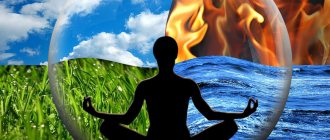Any real education is achieved only through self-education.
Nikolai Alexandrovich Rubakin
Everyone seems to agree that education plays a fairly important role in our lives.
We may have different opinions about what education should be, both in terms of the goals it pursues and the methods by which they are achieved, but we all agree that we need it. It is very difficult to get by without knowledge, skills and abilities in this life. However, people’s opinions regarding self-education are no longer so clear; some see a need for it, while others do not. Intuitively, of course, we all understand that we need self-education, that we need to teach ourselves something new, that it is correct and useful. But at the same time, quite a considerable number of people, judging by their lifestyle, believe that they can completely do without self-education. But let's think about it, what is self-education anyway? And is it really possible to do without it? Self-education is the acquisition by a person of the knowledge, skills and abilities he needs from his point of view through independent studies outside of any educational institution and without the help of a teacher. Although, in my opinion, having a teacher for self-education is quite acceptable. I believe that the main thing is that a person himself wants to learn something, master something, learn something. And how he will do it, with the help of what or who - this is not so important. In any case, the initiative in this matter must come from the person himself - he must want to learn, using all the opportunities available to him.
In general, if you take a deeper look at the process of self-education, you can discover a lot of interesting things in it that have to do with human qualities, capabilities, desires and needs. This is all we will talk about in this article. After reading it, you, dear friends, will learn about self-education all the most important things that, from my point of view, you need to know about it in order to start doing it and do it correctly.
So, let's think again about whether it is really possible to do without self-education in this life, as some people believe? Of course you can get by; in this life you can do without a lot of things if you want. The only question is, what will it be like, this life of yours, if you prefer to do without such important things as self-education? Most likely, not the most successful and interesting, because without new knowledge and without the ability to use it, you will simply be weaker than those who know more than you and whose thinking is better developed. And then, why do without it, if it does not require anything special from a person, except perhaps his time and certain volitional efforts? We still spend our free time on something, for example, on the same entertainment. Why not spend it on self-education, because learning new things is also very fun and interesting? You only need to feel this interest, this joy, this pleasure from self-education in order to become seriously interested in it and become addicted to it. And self-education is necessary because the knowledge that a person can gain by studying at school, institute, university and other educational institutions is unlikely to be enough for him in the modern, constantly changing world. As a matter of fact, the need for new knowledge existed before, but not as acute as it is now, since the world did not change as quickly as it does today.
But from my point of view, it is not even the need for new knowledge that makes self-education important, but elementary human interest and curiosity. Think about it, aren’t you interested in learning more about this world, revealing its secrets, finding something new that you don’t know about yet, even without any practical application of the knowledge gained, but simply for yourself, to fill your inner world? new ideas about the external world? This is so exciting! You know, they say that most people are not curious and lazy, so they are not interested in anything except what is related to their basic needs and they do not strive for anything new. But I don't think so. I believe that curiosity can simply fall asleep in a person due to various circumstances, which is why he squeezes himself into certain limits in order to feel comfortable. However, if you awaken in a person his sense of curiosity, his inquisitiveness, his interest in everything new and unknown, then self-education will become one of the meanings of life for him. We have already done this with some people - awakening their interest and curiosity, after which they radically changed their lives, starting to actively educate themselves and strive for something. I often have to work with people in this direction. So don’t rush to give a definite answer to the question of whether you need self-education or not. Let's take a better look at what it can give a person from a practical point of view.
Education and self-education
But first, friends, let's talk a little about how self-education differs from education, from the standard education with which most of us are familiar. This is very important, because a person’s attitude towards himself and his life will depend on understanding this difference. So, education is, first of all, the transfer of knowledge to a person with the help of a teacher, with the goal of teaching him something that, in the teacher’s opinion, the student should know. And only then education is the process of a person’s assimilation of the acquired knowledge. That is, you see, in education, the teacher is put in first place, who teaches something to other people or an individual in a certain way. Whereas in self-education the focus is on the student himself, that is, the one who learns something on his own. The student in this case is both a student and a teacher at the same time, and all responsibility for the process of acquiring knowledge lies with him. And this allows a person to decide for himself what and how he will learn. It is not at all necessary that self-education should take place exclusively without a teacher; what is important is who manages this process - the student or the teacher.
It should also be noted that education often allows the student to acquire knowledge that he may not need. Whereas other knowledge, which he needs to a much greater extent, may not be given to him for one reason or another. In other words, in education, it is not the student who makes the rules, but those who teach him. It's not that it's bad, it's just not always good for everyone. Therefore, ordinary education may simply not be enough for a person. Or it may not meet his goals. Let’s say the state needs engineers and it influences the education system in such a way that it produces more engineers for the country. But the fact is that you yourself may not be interested in being an engineer, no matter what the reasons, you may be interested in, say, becoming an economist or a lawyer, or, for example, a psychologist, but not at all engineer Because you don’t want to prepare yourself for the labor market, you don’t need a job! You want to create jobs yourself, you want to work for yourself, so you may need an appropriate education. But at the same time, you are forced to adapt to the existing model of education, to the rules that apply in it, to teaching methods, to teaching material, to the current knowledge test, and so on and so forth. And if choosing who to study for and who not to study for, today, in principle, is not a problem - you don’t want to be engineers, for God’s sake, you can study for whoever you want by enrolling in the appropriate educational institution, then that’s what concerns teaching methods, and I I would even say, the rules of training, then it will be much more difficult for you to choose them. And in general, the quality of your education does not always depend on you.
I remember when I was studying - I asked a lot of questions to my teachers and professor when I disagreed with something or was just interested in clarifying something. But I was usually, so to speak, silenced and forced mainly to listen and remember, and not to think and reason, much less argue. Not all teachers and teachers did this, but nevertheless, I was not satisfied with such an education in which it was impossible to take a step to the left or a step to the right in one’s reasoning, it was impossible to discuss this or that topic from a critical position, and besides, I wanted to know more, I wanted to find out why something works the way it does. But in the end, I was forced to behave in the way that was needed by my teachers and the education system as a whole. This is the peculiarity of education - you are taught, according to a program developed by someone, what is needed primarily by someone else, and not by you, with little or no consideration for your interests, desires and life goals.
But self-education can be for you the way you yourself want to see it. You can teach yourself whatever you want and the way you see fit to do it - using a variety of sources of information, and not those that were selected by someone for some purpose. This is a huge difference between education and self-education. Self-education is based on freedom of choice, and education is mainly based on the needs of society for certain specialists.
Tips for self-study
You can learn on your own linearly, in accordance with your personal ideas about how to do it. That is, without special techniques - just take a book on some topic, read it, Google something incomprehensible. But, as in physical labor, special tools increase efficiency and speed of learning. Digging a hole with a shovel is easier than without it. In his essay, programmer Paul Graham explains what you need to do to become a much better student. We invite you to get acquainted with his ideas and try them on yourself. Read more…
2
Follow the schedule
Working out at the same time is extremely important. Scientists who work on the phenomenon of memory have found that knowledge fits well in the head if you study regularly and at the same time. The brain adapts to our daily routine. It is clear that the pace of life in a modern city is high and we are sometimes forced to change plans, however, try to reduce to a minimum all situations that would distract you from your studies.
How much time should you allocate? A standard academic hour lasts 45 minutes, so we focus on this time.
By the way, it was not taken out of thin air. It has long been noted that after 45 minutes, students’ attention is scattered, concentration disappears, and the necessary information ceases to “compact” in the consciousness. You definitely need to take a break or continue studying tomorrow.
Tips for effective self-education
You have decided to educate yourself, great! But this is only the beginning of a long journey. What's next? What questions are gnawing at you? This article discusses frequently asked fundamental questions that people ask themselves when educating themselves, and provides detailed answers to them. We'll tell you where to start, how to organize the process, how to remember information and learn faster. Of course, the article does not exhaust the topic, but it can still be used as a guide to action. Read more…
3
Choosing a time
If we continue the topic “Where should a person begin to educate himself,” then in no case should we ignore the choice of the optimal time. You should not hope that you will read the necessary literature or listen to lectures when you have time. This is a failed path in advance. There will never be time, you can believe it. There is always some urgent and extremely important matter.
So decide that every day (or just on weekdays) you will read or listen to selected books while jogging, driving to or from work, one hour before bed. It is very important not to get out of this schedule. Over time, there will definitely be a desire to postpone the matter or give yourself a little indulgence. If you are led by your laziness, you can immediately give up self-education, which means this is not for you.
Self-education plan
Why do you need a self-education plan? It may seem like a lot of work when you can simply buy 3-4 books on the topic and start studying them, right? But no! One of the main problems of self-education is that without a clear plan and understanding of what and how to learn, it is very easy to get confused and give up the whole idea. This is why you need to first study the topic and create a plan - it will be a kind of compass with which you will begin your journey. In addition, a plan motivates, helps combat disorganization, serves as a visual reminder, and has other benefits. Let's get to know them. Read more…
4
Stop procrastinating on studying
The most important thing to calm down is to put things off for an hour, which eventually stretches out over the whole day. And then the next day. And for the whole week. During this time, you manage to replay The Witcher, send a ton of messages on VKontakte, stick to Telegram, hang out with friends. And the textbook still lies on the table, covered with dust.
All you had to do was just sit down, open this textbook, take a notebook and pen, and start studying. The sooner you start, the sooner you will finish.
By the way, this is precisely the principle that our parents drilled into us when we had to do our homework. Generally correct principle. It’s just that in our adult life we have completely forgotten it.
Interliving for self-education
Learning one skill or subject at a time is how we learn from school. This technique is used everywhere, and we have all been very familiar with it for a long time. But is there a better way? Modern scientists and psychologists are sure that there is, and this is interlearning - a teaching method in which it is aimed not at one area of new material, but at several at once, i.e. mastering the material occurs comprehensively. In this article we will try to understand why the method is considered so promising and effective, and also give some tips on how to use it. Read more…
5
Undeniable advantages
This method has advantages among alternative teaching methods. Do you need to educate yourself? The answer will be given by the following facts:
- Oddly enough, self-education is up-to-date knowledge. The modern world provides us with a completely new model for obtaining information. Most ideas are first actively discussed on the Internet and only then published in books and translated into other languages. By the time it comes to their inclusion in the educational program, new ideas will already appear. As a result, what we are taught in schools and universities loses its relevance. An important advantage of self-education is to always be aware of the latest news; it is an opportunity to learn new things when the idea itself is still in its infancy. To a greater extent, this concerns information technologies, which are important in modern science. While the material from textbooks can be considered hopelessly outdated.
- Self-education is an opportunity to tailor the learning process to suit yourself. Often, curricula in schools and universities are filled with information that may never be useful, and time is wasted on it. Trying to remember something unimportant just because a program requires it forces out of your mind what is really necessary. When organizing self-education, a training plan is drawn up only based on individual preferences and needs.
- Self-education is an opportunity to create the right environment. At the university, the circle of like-minded people is limited to classmates, and in the process of self-study you can exchange your thoughts with absolutely any people around the world using the Internet.
- Self-education is an opportunity to learn from the best, and not from those who have to. You can turn to absolutely any person you are interested in for help, read the literature of those specialists who, in your opinion, are really up to date with events.
- Self-education is time control. Formal training means a strict schedule, deviation from which has consequences. While with self-study, you can build your schedule so that you study at the most convenient time for yourself.
- Self-education is free. Often the most important resource to spend is time. Traditional training also requires a lot of money. Even paid online courses cannot match the cost of formal education. For example, some courses at Skolkovo cost no less than 95,000 euros.
Now all that remains is to figure out how to educate yourself with maximum efficiency.
Discipline in self-education
Since you are interested in the topic of self-development, it means that the topic of self-education is not alien to you. But you, like many other people, probably experience difficulties with a lack of time, motivation or self-discipline, which is why many good intentions to learn something on your own remain only declarative. At best, you learn case by case. This all leads to confusion, sometimes it even seems that it is impossible to master something really complex, for example, programming. But this is not so, and in this article about discipline and its importance in self-education we will try to explain how to correct the situation. Read more…
6
Adhere to the “carrot and stick” principle
Coming up with rewards for successfully completed work is extremely important. However, the human brain is such a tricky thing... It is enough for him to simply think about the work done, and he immediately advises you to encourage yourself.
For this reason, by the way, many people cannot lose weight. All you have to do is decide that you will definitely sign up for the gym and start eating right, when your consciousness immediately begins to whisper: “What a great fellow you are! Now you can buy that cheesecake over there instead of an apple.”
Nobody argues - there should be a reward for work successfully done. But only if the work was DONE and brought the desired result. So, resolutely stop all attempts to please yourself BEFORE classes.
Why study all your life: understanding the meaning of education and self-education
Many of us have asked our parents at least once in our lives: “Why do we need to study?” Perhaps one day such a question will overtake you, because children, as a rule, are not very keen on knowledge, they are more interested in abstract matters and not related to their studies. What do you think is the point in the education process? Is it necessary to learn, and how do you feel about the concept of lifelong learning? In the article we will talk about why you need to study all your life and talk about related topics. Read more…
7
Catch the wave
Having peace of mind before sitting down to study is very important. It makes no sense to deal with heavy thoughts and emotional stress. There are many ways to switch your mind, and it doesn't have to be relaxing on the couch. You can run, sweat a little in the gym, listen to your favorite music, take a contrast shower, etc.
By the way, a change of environment helps many people. It is not at all necessary to pore over books at your desk. After a couple of sessions you will simply hate it. Change your surroundings to a summer park or even your favorite sofa if it helps you concentrate.
How to create your own self-learning system
Behind every success is a system or strategy. It helps both at the learning stage and during work. A self-learning system is a systematic way of weeding out unnecessary information and remembering what is most necessary. You've probably made attempts to learn something: a programming language or a foreign language. And, most likely, you didn’t have a special strategy: a minimum of free time and hope for a ready-made guide or list of books. You started to study, but at the same time you intuitively understood that you were doing something wrong. You simply lacked your system. And the sooner you start it, the faster you will begin to benefit. Read more…
8
Don't forget to repeat
Repetition is the mother of learning. Everyone remembers this, but only those who achieve success apply it in practice. On first reading, most people remember about half of the material, and the lion's share of this information will soon be forgotten. If, after some time, you re-read the material that interests you, you will assimilate up to 90-95% of the information, and the risk of forgetting something will sharply decrease.
Create a suitable schedule. For example, 20-25% of the time allocated for self-education should be devoted to repeating the material covered. Some may think it is stupid to waste so much precious time, during which you can learn additional important information. But remember: you are working for yourself. This means that all important material should be remembered, and not read and immediately forgotten. There will be no exam, after which useless knowledge can be forgotten. You create the program yourself and know that all the data read (listened to or viewed) by you must be assimilated, if not forever, then for many years.
Lifelong learning: 5 recommendations
Life-long learning is lifelong learning or continuous learning. This term denotes the desire for continuous acquisition of knowledge. Life-long learning is a way of life in which a person refuses to stop his development, and through various forms of learning, including self-learning, continues to absorb new knowledge and master new skills. In the article you will learn what Life-long learning is, and also receive specific practical recommendations on how to make lifelong learning a part of your life. You don’t think that education should be limited to school and college, do you? Read more…
9
Using the Internet
When telling where to start self-education for an adult, one cannot fail to mention the Internet. After all, this is not just a bunch of social networks and sites with interesting facts or photos of cats. This is a limitless treasury of knowledge, where all the wisdom of humanity is collected. The main thing is to find her.
Select the books you need. Many of them can be downloaded from free sites or purchased for a symbolic cost of several tens of rubles. This is much easier than looking for highly specialized literature in a small town and paying hundreds or even thousands of rubles.
Don't ignore webinars. Either for free or for a few hundred rubles, you get the opportunity to communicate with experts in a matter that interests you, ask them questions, and receive comprehensive answers.
Online program “Self-education: the best techniques”
In this 5-week program, you will learn to apply various techniques and models of self-education, with the help of which you can learn faster, more efficiently and more interestingly. You will understand how to correctly set educational goals, motivate and discipline yourself, and cope with laziness and procrastination. Learn to draw up a plan for self-education, select relevant sources for learning and work with them, and also master a lot of useful skills related to self-education, such as speed reading, using mnemonics, effective note-taking and others. Find out more...
We recommend that you do not put off applying the acquired knowledge for a long time, and it is even better if you make self-education your habit. We wish you success!
We also recommend reading:
- Storytelling
- Learn to Learn: Some Tips from Coursera's LH2L Course
- Secrets of self-education
- Best of the year. Part two
- Tips for self-study
- Best of the year. Part three
- Discipline in self-education
- Self-education plan
- Interliving for self-education
- Nothing is clear, but very interesting
- Frequently asked questions during self-education and answers to them
Keywords:1LLL
We set ourselves a goal
First you need to decide on your goal. No person starts self-education just like that. It is unlikely that anyone would think of just studying the structural features of the ganglion in large ants or the declension of irregular verbs in the Irish language. Most people look for the answer to the question: “Where to start self-education?” at the moment when they realize that they need to know more in a certain area.
That is why it is very important to set a goal for yourself, having achieved which you can be proud of yourself. The goal can be very different: for one it is enough to simply become a more interesting person with a broad outlook. And another urgently needs to learn a foreign language or the basics of jurisprudence in order to be able to take a vacant position in the company by the end of the year.
However, a person engaged in self-education does not always strive for such complex and lofty goals. Often everything is much simpler, for example, learning how to repair a car, mountain bike or computer yourself. Or maybe learn the basics of cooking.
In any case, you need a goal to have something to focus on. It should be prescribed depending on what you want to achieve. Become a well-rounded person? Find the top 100 best books in the world and read by the end of the year (at least the next) all those that you haven’t read yet. Do you want to learn a foreign language? Decide by what point you should be able to read it fluently and by what point you should be able to communicate with other people. Have you ever dreamed of learning to cook? This means that by the end of the month, prepare ten new dishes, and by the end of the year, master a hundred.
The goal does not have to be global, it can be small, the main thing is that it is achievable. After all, achievement will raise your self-esteem and allow you to believe in yourself.
Kinds
What is it, and what advantages of self-education have you already understood, now I want to introduce you to its variety:
- Household. Learning something during leisure time or to perform household chores.
- Cognitive. Replenishment of information about the surrounding world.
- Self-realization. Development of intellectual abilities, or physical fitness and endurance, spirituality and morality. You can read about ways to develop your physical fitness here.
- Professional. Improving your skill level in order to achieve success and advance in your career and gain social recognition and approval.











